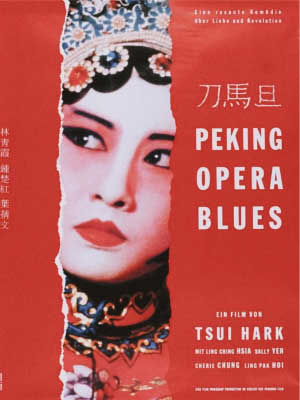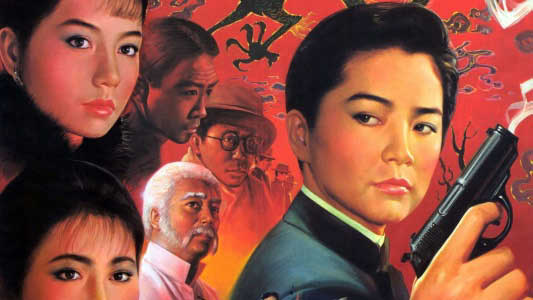Peking Opera Blues
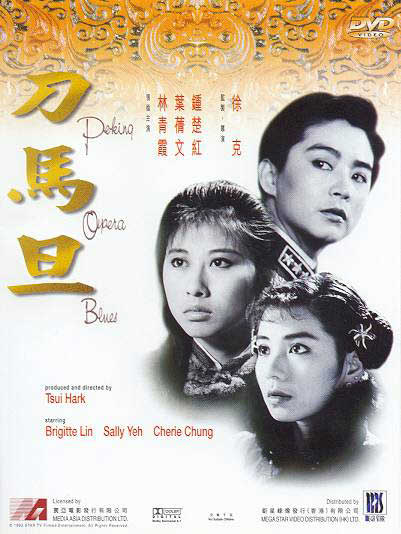
Director: Tsui Hark
Year: 1986
Rating: 10.0/10.0
This was one of the
most influential films that helped shape the incredible burst of creativity
that occurred in HK films during the 1980s. It is directed by Tsui Hark
in a swirl of colors and non stop motion, but it also has an emotional center
that draws you in like a vortex and never lets you go. At times it feels
almost weightless as it pulls the viewer along for a frenetic and fascinating
ride. Underneath all the fabulous images though lies a powerful story that
explores the themes of nationalism, family, friendship and sacrifice.
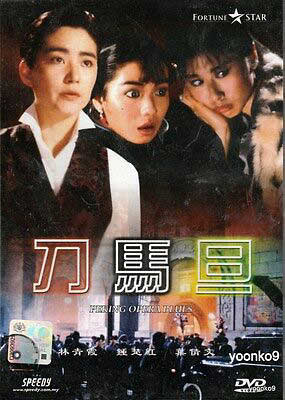
The story takes place back in 1913 when the Manchus no longer rule China.
The new democratic government is too weak to rule effectively and multiple
warlords occupy large parts of the country . The viewer is dropped right into
the middle of this chaos and it is a while before all the different parties
can be sorted out. The story centers around three women (an earlier Heroic
Trio!) - Brigitte Lin as a daughter of one of the warlords - but her loyalty
is to the Republic, Cherie Chung in a wonderfully comic, charming role as
a musician caught in the middle of it all and Sally Yeh (of The Killer fame
of course) as the daughter of a man who runs a Peking Opera troupe. Events
conspire to bring all three women together and what a show it becomes.
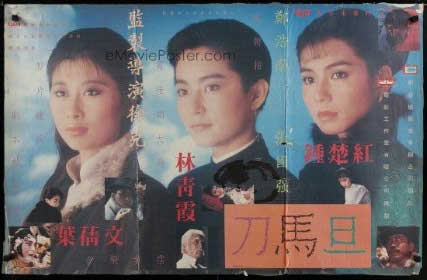
From the opening moment of the cynically laughing Peking Opera performer
to the last frame, this is a work of brilliant storytelling and editing.
Incredible action sequences, exciting chases and escapes, great performances
from all three females and a story that just works magic. The final 20 minutes
from when the bad guys surround the theater is astonishing and exhilarating.
I think people might be put off by the title of this film and think it is
some old fashioned costume drama (I know I was for a long time), but believe
me this film is not to be missed for any reason whatsoever. It is one of the
great films of our times.

My rating for this film: 10.0
Reviewed by YTSL
There are some people -- and quite a few Internet
purveyors – who characterize that which Barry Long deems "(a)n undisputed
classic" as an action (adventure)-comedy. Tsui Hark's masterpiece --
considering how many splendid works he has been involved in bringing to the
silver screen, this is saying a tremendous lot -- certainly has its share
of "sheer hyperkinetic pleasure" which "makes Hollywood stunt films look
simple-minded" (John Powers, in "Hong Kong Babylon"). The Washington
Post film critic who viewed this 1986 work more than ten years ago raved
that it "is transcendent escapist entertainment. You can't contain your giggles.
And it puts you in such a receptive mood that the howlingly inappropriate
subtitling ("There's a girl. Knock her up") merely adds to the fun."

Many of the action scenes and sequences in PEKING OPERA BLUES are definitely
memorably gasp- inducing. That which occurs on not completely stable
rooftops immediately comes to mind along with quite a few of those that take
place within the confines of the Peking Opera house. Then there's the
General's daughter's acrobatic as well as desperate and determined first bid
to slay her father's killer. Re that last segment: I find the
absolute anger and anguish registered on Brigitte Lin's face as her character,
blinded by emotion, strives to fulfill her aim simultaneously chilling and
heart-breaking.

This amazing movie does contain slapstick and playful episodes that make
this (re)viewer smile, snigger, chuckle and laugh out loud. However,
this truly genre-transcending -- not just multi-genre -- film is much more
of a dramatic work than a comedy, much less a straight action flick -- to
me. As such, much of my ostensibly light-hearted reactions to particular
portions of the very aptly titled PEKING OPERA *BLUES* actually comes out
of my being often made privy -- the more so the further along one goes in(to)
the film -- to deeper, dark, at times damning knowledge.

By way of illustration: While the sight of the three Chinese heroines
(Cherie Chung and Sally Yeh, along with the luminary listed in the opening
credits as Lin Ching-Hsia, truly breathe life into the complex characters
they so memorably essay here) uncharacteristically clad in Western nightgowns,
listening to gramophone music, drinking champagne and carefully examining
a globe makes me smile, that charming scene is quite obviously set up to dramatically
contrast not only with what had previously occurred but also with what is
(still) to come in the movie and the lives of the three women. With
regards to another scene: Even as I am amused by Tsao Wan's (Brigitte
Lin's) facial contortions when frustratedly waiting for her father (ably portrayed
by Kenneth Tsang) to eat the medicine-laced dim sum while he views with obvious
delight and relish the on-stage antics of two women (Sally Yeh's Pat Neil
and Cherie Chung's Sheung Hung), I am moved to consider and understand the
repercussions of General Tsao not doing what was planned.

If it is not already apparent, this is one film that I love and have watched
multiple times. That which made a Hong Kong movie fanatic of me is
appreciable on many levels and so multi-layered that it still is revealing
new details, thoughts and ideas to me each additional time that I view it
(the last being five days ago, when I introduced it to a Malian friend of
mine...who loved it too and expressed the opinion that it's more thought-provoking
and -packed than "Ashes of Time"...). In fact, I will suggest that what
has been lauded as "The Citizen Kane of Hong Kong" movies (on the Hong Kong
cinema database) as well as that which "out-Spielbergs Spielberg" may actually
be too fast-moving, eventful, and contain so many different characters, stories,
arguments and viewpoints as for quite a few of the no less important ones
to be effectively obscured by flamboyant others. Consequently, they
can only reveal themselves after one's brain finally processes the initial
resplendent onslaught.

This is not to say though that PEKING OPERA BLUES cannot appear marvelous
at first sight. Rather, it is that repeated viewing allows one to do
such as appreciate all the more: The vulnerability as well as fortitude
of Tsao Wan; the bravura performance of Brigitte Lin; Pat Neil's cutting
through of ideology and ambition with an infusion of humanity; the subtle
acting of Sally Yeh (which rivals that of Brigitte Lin and complements the
consciously exaggerated actions of Cherie Chung); Sheung Hung's enterprise
and adventurous spirit amidst her fear of heights and blood; Cherie Chung's
feminine charm along with comic talents; and the male supporting actors
(including Mark Cheng, Cheung Kwok-Keung, Wu Ma and Paul Chun Pui) whose
efforts really ought not to go unmentioned.
My rating for the film: As close to a perfect
10 as humanly possible.
